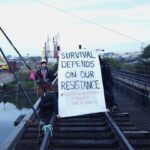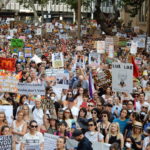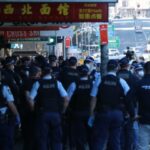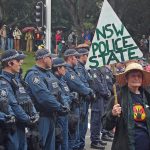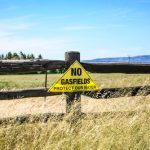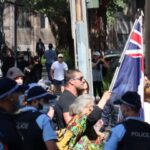The Death of Protest in NSW: An Interview With Greens MLC Abigail Boyd
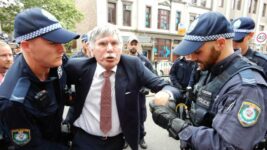
Date published: 7 April 2022
The June 2020 Sydney Black Lives Matter protest rocked the city to its foundations, as it had a focus on NSW police brutality towards First Nations peoples, then police commissioner Mick Fuller tried to have it prohibited citing COVID grounds. And the Supreme Court went on to call a halt to it based on a legal technicality.
Despite the ban, tens of thousands showed up at Sydney Town Hall for the rally. And even though the first lockdown had been lifted, they still faced $1,000 fines, as public gatherings of more than 500 remained outlawed due to the pandemic restrictions still in place.
Fifteen minutes before the protest was set to commence though, word came through that a special sitting of the appeals court had overturned the technicality ruling, which involved the form that had been submitted under the Summary Offences Act 1988 (NSW), so the protest could go ahead.
But as of last week, if the same scenario occurred, the tens of thousands of protesters would be facing up to two years imprisonment and/or a $22,000 fine. And it’s highly unlikely an appeal would have taken place, as now it’s easier for authorities to refuse such a demonstration outright.
The authoritarian creeps
A series of recent unauthorised actions by climate defenders caused NSW roads minister Natalie Ward to add section 48A to the Roads Regulation 2018 (NSW) on 24 March. This broadened a ban on trespassing and obstructing the Sydney Harbour Bridge to all tunnels and bridges in Greater Sydney.
Ward was able to add this new law that carries maximum penalties of up to 2 years inside and/or a $22,000 fine, because regulations are a form of delegated legislation, which means there’s no need for a vote in parliament. Indeed, this style of law-making is increasingly being exercised.
Meanwhile, NSW attorney general Mark Speakman whipped out his Roads and Crimes Legislation Amendment Bill 2022 and rammed it through both houses in record time. It expanded the same law Ward was fiddling with, section 144G of the Roads Act 1993 (NSW), so it now includes roads.
Speakman also inserted section 214A into the Crimes Act 1900 (NSW), which carries the new offence of damaging or disrupting a major facility.
Carrying the same draconian section 144G penalties, this law amongst its other stipulations, makes it an offence to obstruct entry into a major facility, which is defined as a railway station or other transport hubs, any ports, and infrastructure.
Shifting climates
Taken to their extreme, these laws not only give the state the power to silence dissent in general, but they’ve actually enacted a framework that facilitates the imprisoning of the government’s civilian opponents who are trying to counter its regressive championing of profit over planet.
As NSW Greens MLC Abigail Boyd remarked following the passing of the bill, peaceful public gatherings are fast becoming a memory, while future protests must be on state-sanctioned topics, and these recent actions are “one of the most shameful episodes” in the state’s history.
Sydney Criminal Lawyers spoke to Abigail Boyd about the extreme way in which the Perrottet government moved to enact these anti-protest laws, the further implications they hold, and how the NSW roads minister seemed quite distressed about being held up in traffic on the Spit Bridge.
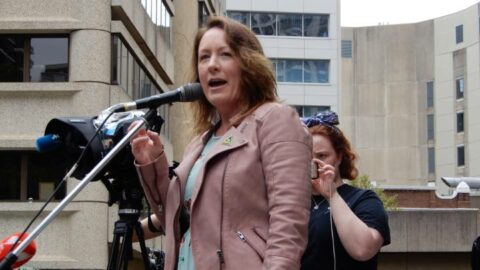
The new Liberal Nationals anti-protest laws were drafted and passed in a little over a week.
Abigail, in parliament, you described these laws and sanctions as “a politically motivated crackdown on dissenting opinion and it should send shivers down the spine of every person in this state”.
So, can you expand on why this should be of concern for everyone in NSW?
It’s the most draconian thing I’ve ever witnessed in NSW parliament. It now means that we have some of the most severe anti-protest laws in the world.
What happened within a 48 hour period was these laws were introduced with very little consultation. There was about four hours consultation with the opposition members. And then we were expected to vote on and pass them through within the day.
This is an extraordinary thing for the NSW Coalition government to do. They effectively abandoned debate in pushing through this legislation more quickly than any other substantial legislation that we’ve passed in this term of parliament.
So, everybody should be concerned. And not just about the antidemocratic way that it was pushed through parliament, but also in terms of the very broad scope under the new legislation to effectively prevent any protest or action that the government decides it doesn’t like.
So, that’s whether you’re out there on the streets rallying for climate action, women’s justice or Black Lives Matter, or you can be caught out if you partake in one of the so-called freedom rallies or antivaxx protests on the other side of politics.
This is an instrument that can stifle dissent effectively at the stroke of a pen from the minister.
As attorney general Mark Speakman pointed out during his second reading speech on the bill, there’s already a legal protest regime set out in the Summary Offences Act, which outlines how organisers can alert police prior to a proposed rally, and therefore hold it legally.
Why doesn’t this system suffice in all circumstances? Why should it still be within feasible reach of most activists to be able to take disruptive and unannounced actions?
Under the previous legislation, where we just had the Summary Offences, you could put that notice into the police, and if they wanted to stop you going to your protest, you could take it all the way to the Supreme Court, so that it could decide whether your protest was going to be legal or allowed.
What we have now in NSW is a regulation making power that’s been given to the minister for roads, which allows her to declare any location be it a road, bridge, tunnel or even major facility to fall under the scope of these anti-protest laws.
The minister could even declare my house a major facility under regulation, and if I held a small gathering outside where people had to walk around or be redirected around me and I haven’t got police approval, then I could be potentially caught under this legislation. That’s how broad it is.
NSW metropolitan roads minister Natalie Ward expanded a pre-existing law to restrict interfering with the Sydney Harbour Bridge, so that it extends to any bridge or tunnel throughout Greater Sydney. But Speakman’s bill extended this to include roads as well.
These laws have been presented as a direct response to the growing actions of climate defenders, but, as you’ve already suggested, doesn’t the inclusion of obstructing roads enhance the ability of the Coalition to silence dissent on a broader range of issues?
Absolutely. We have not just an extension to roads but also this concept of a major facility. And whether it is a road or a major facility, these are terms that then can be decided by the minister of the day at the stroke of a pen using regulation that does not get scrutinised by the parliament.
So, we already saw the minister enact a regulation to bring a form of these laws in last week, which only applied to the Greater Sydney area.
But, on Friday, as we were debating the new protest laws, she issued a new regulation, which extended those existing powers to the whole of the state.
When you give ministers power to prescribe things so easily under a regulation without immediate parliamentary scrutiny, they can effectively shut down any protest they like in any location.
So, now we can have the scenario where people state they want to have a BLM protest at a certain location, but if the police say it can’t go ahead, and people show up anyway, these people could potentially be thrown in prison for two years.
That’s right because you don’t even need to cause any damage. The legislation says that if you are around one of these locations that have been proscribed – say you’re on this road or at this bridge – as long as somebody has to be redirected around you that’s sufficient for you to then fall foul of the act, and to be able to be put in gaol for two years.
A mere redirection around you is considered to be enough of an inconvenience for the legislation to take effect.
These laws were rushed through within a week. Speakman cited the actions taken by Blockade Australia and Fireproof Australia as having prompted them. Yet, these are not the first unannounced climate demonstrations by any means.
So, why do you think the government jumped to attention immediately this time?
There’s a couple of things going on here. Firstly, it was a convenient excuse to use those particular protests as the catalyst for this legislation.
But when you look at the broader legislation that was drafted, and when you listen to the debate we had on various positions, it’s clear, particularly from minister Ward’s comments, that this is going to apply to anybody who causes disruption.
This legislation is not to prevent major protests where perhaps they think that some infrastructure will be damaged or that the protesters themselves will be harmed.
We kept hearing the minister talk about how she had personally sat on the Spit Bridge during one of the protests and had been inconvenienced by being made late to work.
But the broader picture here is that we have a federal election coming up, and that’s why everything had to be so rushed from the government’s perspective.
We were trying hard to filibuster and delay the passing of the legislation until the May sitting period, which would have been after the federal election, preventing the ability to shut down inconvenient protests that make the federal government look bad.
Does the passing of these laws mean that effective protest has been defeated in NSW, or are their feasible ways to get these measures reversed?
We’ll be trying everything we can to reverse them. In regard to the new regulation that was made on Friday that extended these existing powers, we will seek to disallow those as soon as we get into parliament again in May.
We are also expecting a number of other regulations to be passed between now and then that will give us a chance to disallow them in May.
But, fundamentally, in my legal opinion, and given everything that I’ve read, these new laws are not going to be compatible with the Constitution.
So, one possible way of defeating these laws is for a test case to be run or for the next person who gets caught by the laws to take their case to the High Court and have it struck down.
But, in the meantime, the Greens will be disallowing every bit of regulation under these laws and continue to raise the alarm.
I’ve been speaking with a lot of activists who say the climate crisis is so extreme and so threatening that it doesn’t really matter how much you threaten them with gaol time and penalties, they’re still going to take to the streets and there are only so many people the government can throw in gaol.
That leads into my last question. These laws have the potential to rule out protests if the government takes affront to them for some reason.
But the toughening of protest laws was a direct response to escalating climate actions. The climate emergency is rapidly growing, hence the more drastic protests. But rather than heed the message, the authorities are enacting greater repressions in order to silence it.
Abigail, how do you see this all playing out from here?
The IPCC just came out with its final report to say that we’re actually on track to increase our greenhouse gas emissions by 2030, rather than decrease them.
This is a climate emergency. And the government at both the state and federal level are increasingly out of touch with community sentiment on this issue.
People have seen it so clearly now with the fires and the floods. People want serious and urgent action to be taken on climate change, and governments aren’t listening, so we have no other choice but to take to the streets and protest.
When you understand climate science and you understand just how threatening the government’s actions are for our future existence, we have no choice, regardless of the penalties, but to protest to get the attention of government.


